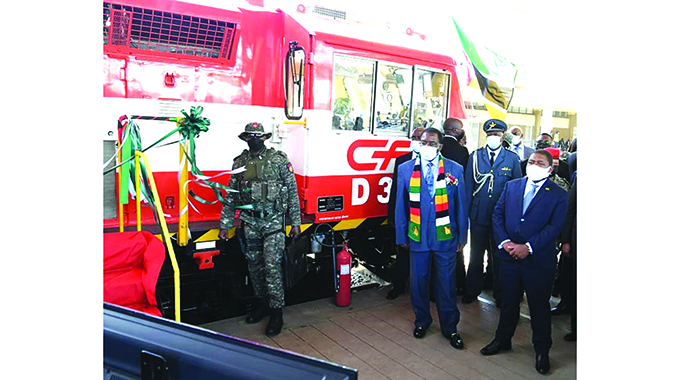Source: Harare, Maputo deepen economic ties | The Herald
Kudakwashe Mugari in Beira, Mozambique
ZIMBABWE and the rest of SADC countries are set to benefit from infrastructural development being undertaken by Mozambique, with President Mnangagwa and President Felipe Nyusi committing to facilitate the emancipation of their people through economic development.
Mozambique has embarked on a massive rehabilitation of all its ports, roads, as well as railway lines linking it with Zimbabwe.
Currently, Mozambique is constructing Machipanda railway line that will link the two countries, with discussion on the construction of a new port that will benefit Zimbabwe, Malawi and South Africa on cards.
A railway line from Sango Border in Chikwalakwala that will link with Maputo is being rehabilitated, with the Chinese Government also expanding Nacala Port.
Zimbabwe transports sugar cane for export through Sango Border, Chikwalakwala railway line to Maputo, and the outside world.
In a friendly gesture, President Mnangagwa, who was in Beira for a one-day official working visit, donated 1 000 tonnes of grain to help victims of terrorism attacks in the province of Cabo Delgado and some parts of Mozambique
The President announced the donation in his address after witnessing the commissioning of four state-of-the-art locomotives and 150 wagons sourced by Mozambique from India.
The Indian government will also rehabilitate the railway lines that link Mozambique and SADC countries, including the Chikwalakwala line that links with Maputo.
“There is enough friendship between India and Mozambique. We have witnessed the delivery of four locomotives and 150 wagons and others are still coming. This is not only for Mozambique but also for countries like Zimbabwe, Botswana, and Malawi that will be land-linked by the railway services,” said the President.
Like Mozambique, the President said Zimbabwe was also implementing infrastructural development projects.
“We have a similar programme unfolding in the rehabilitation of the railway system in Zimbabwe based on consensus facilities given by the Republic of India. Like Mozambique we are also collaborating with India,” he said
President Felipe Nyusi in his address commended Zimbabwe for its unwavering support to the people of Mozambique.
“I want to thank President Mnangagwa for his donation of 1 000 tonnes to the victims of terrorism. The kind gesture will go a long way. Also Zimbabwe has been very supportive in terms of security. We have Zimbabwe officers participating in the training and development of our soldiers who are fighting against terrorism here. Mozambique will remain a partner of economic development of Zimbabwe,” Mr Nyusi said.
Zimbabwe and Mozambique enjoy cordial bilateral relations, underpinned by strong historical and political bonds that date back to the era of the liberation struggle.
“We are also exploring areas of power and energy. We are neighbours and we will have partnerships so that we must not have Language of politics only. I also told President Mnangagwa that the trained youth by Zimbabwean officers fought and resisted terrorists from occupying Paimar in Chimoio. We commend Zimbabwe for that”.
Yesterday’s meeting further deepened existing economic, political, cultural, and social relations between the sister countries.
President Mnangagwa and President Nyusi discussed bilateral, continental, and global issues, and reaffirmed their commitment to further cooperate closely on multilateral issues.
President Mnangagwa also took the opportunity to castigate countries that brought funding and aid to Africa with strings attached.
“Countries like China, Brazil, India, and Russia give us good support without strings attached to it but countries I did not mention here put strings to their support and as SADC we don’t want that.”

COMMENTS